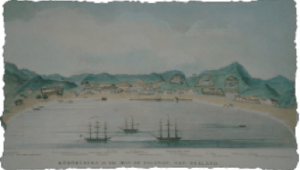
Decline
of the 1840's



The British authorities and the Māori rangatira had very different understandings of the deal they had entered into. The British believed they had full sovereignty, that they were entitled to govern Māori as British subjects. Māori believed that they were guaranteed their autonomy and authority over the land.

A highly prized kauri tree. Northern Māori were offended when the Governor tried to ban the felling of these trees, seen as a direct threat to Māori revenue.
Photo: Department of Conservation
They expected kāwanatanga to apply to the pākehā settlers, traders and land agents, but that the chiefs would look after their own people as they always had. These conflicting expectations, created or exacerbated by the different versions of Te Tiriti, ultimately caused the Northern War.
The imposition of European laws and government regulations generated resentment among northern Māori. For example, the case of Maketū caused a furore. Maketū murdered a pākehā woman, a servant, and two children, one of whom was the granddaughter of an important rangatira. It was never a question of whether Maketū was guilty – he certainly was. It was a question of who should administer his punishment. In the end, he was tried and hanged by the British, a method of execution, which some Māori considered barbaric. Māori were angry that chiefly authority and traditional justice had been pushed aside in favour of the British justice system.
In 1841, Governor Hobson declared a ban on the felling of kauri trees, intended to stop dishonest operators from taking trees to which they had no right. Māori perceived it differently: it was government interference and a direct threat to Ngāpuhi revenue. More money was lost when Hobson banned the northern chiefs from charging anchorage fees. The chiefs had been doing so for some time, charging perhaps five pounds per vessel. The chiefs were banned from collecting the money, in favour of a system of customs dues payable to the government.
The shift of New Zealand’s capital from the Bay of Islands to the nascent city of Auckland caused a downfall in the fortunes of northern New Zealand. The move was insulting to Ngāpuhi who had spent decades building a relationship with the British. Shipping declined, demand for produce and timber dried up, and Ngāpuhi found it increasingly difficult to obtain European goods. In summary, Ngāpuhi were worse off financially after the signing of Te Tiriti than they had been before.



